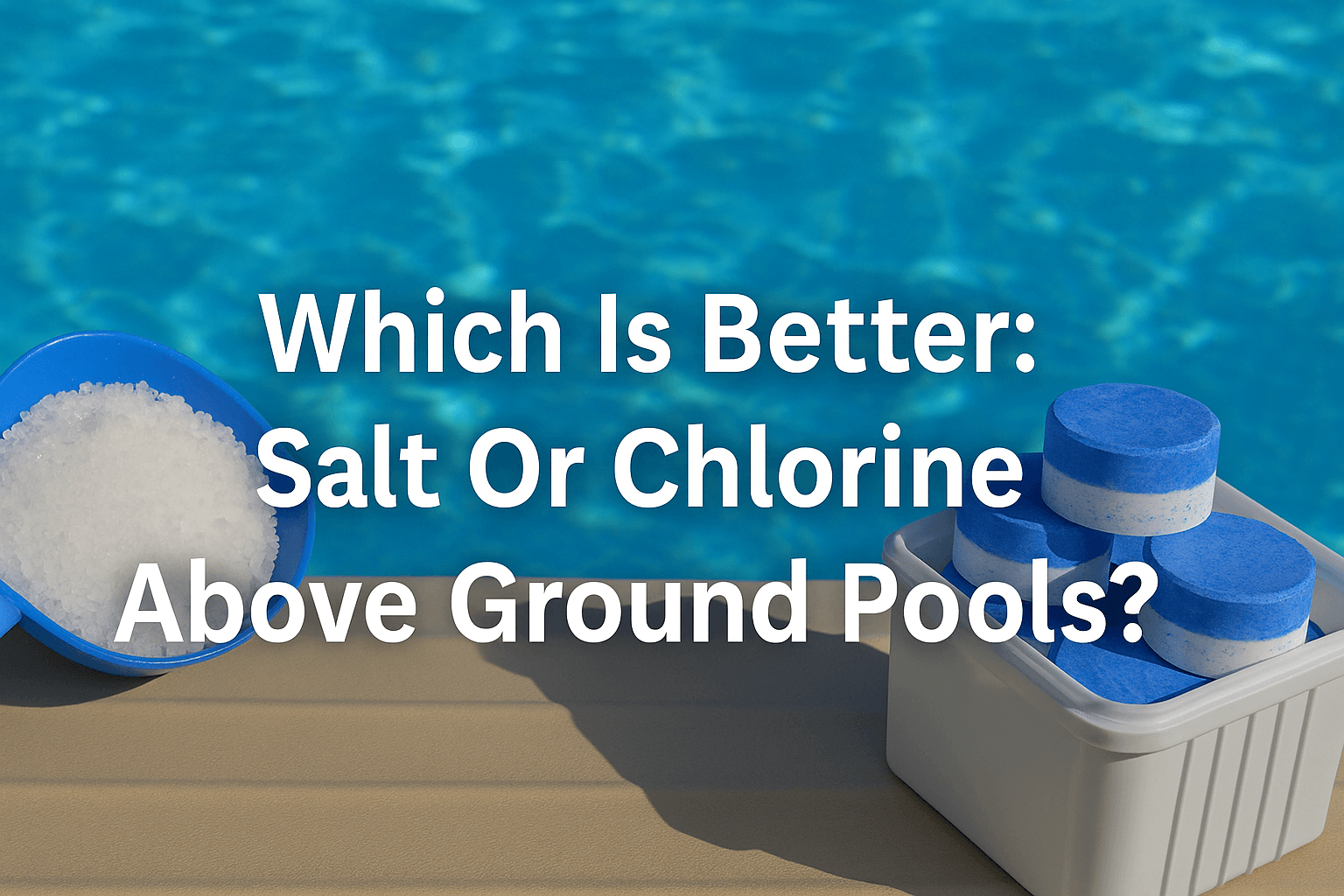
Which Is Better Salt Or Chlorine Above Ground Pools?
Tired of pool water turning your kids into itchy raisins? Quick answer: saltwater’s gentler, but chlorine wins on cost and simplicity. Picking the right one depends on your skin, budget, and fuss-level. Dive in to find out which works best for the best above ground pools—and your sanity.
As parents, we all want the same thing—a clean, safe pool our kids can enjoy without a care in the world. But when you're setting up an above ground pool, one big question pops up: saltwater or chlorine?
It’s not just a matter of preference—it affects your wallet, your weekends, and even your skin. Don’t worry, though. We’ve broken it all down, with real pros and cons based on experience.
Understanding Traditional Chlorine Above Ground Pools
How Chlorine Sanitises Water
Chlorine has been the go-to for decades. Why? It’s fast, powerful, and kills off bacteria and algae like a champ.
Whether you're hosting a splash-filled birthday party or just enjoying a quiet dip, chlorine keeps the water safe. But it’s not all sunshine and cannonballs.
Advantages of Chlorine (Lower Upfront Cost, Immediate Action)
Chlorine systems are often the cheaper option to get started. No fancy equipment, just your pool, some chemicals, and you're good to go.
It's also easy to find and quick to work—ideal when the water’s gone cloudy and you've got guests arriving in two hours. You can manually control levels, giving you immediate results when things go off.
For busy families on a budget, that kind of flexibility can be a lifesaver.
Disadvantages (Harsh on Skin/Eyes, Chemical Handling, "Chlorine Smell")
But let’s be honest—chlorine can be a bit of a diva. It dries out your skin, stings your eyes, and that smell? You’ll smell like a public pool for the rest of the day.
Plus, handling and storing chemicals isn’t exactly child-friendly. You’ll need a safe space to keep them and always take care during use.
It’s doable, but it does add a layer of hassle.
Maintenance for Chlorine Pools (Daily Dosing, Shocking)
Owning a chlorine pool means you’re part chemist, part lifeguard.
You’ll need to test and top up levels regularly, especially in hot weather or after a lot of use. Shocking the pool—giving it a big chlorine boost—is something you’ll do every so often to reset the water.
It’s not hard, but it is hands-on. If you’re the “set it and forget it” type, it might not be your ideal match.

Exploring Saltwater Above Ground Pools
How Saltwater Chlorinators Work
Converting Salt into Hypochlorous Acid (Natural Chlorine)
Saltwater pools sound fancy—but the science is pretty straightforward.
Instead of adding chlorine, you add salt. A special system called a saltwater chlorinator zaps that salt with electricity, turning it into a gentler form of chlorine (called hypochlorous acid) that sanitises your water automatically.
It's like having a pool that cleans itself—well, almost.
Advantages of Saltwater (Softer Water, Less Irritation, Reduced Manual Dosing)
One of the biggest perks? It feels amazing.
The water is softer, smoother, and far less likely to dry out your skin or make your kids’ eyes go red. There’s no strong smell either, which makes a big difference when you're spending hours in the pool.
And because the system handles most of the sanitising, you won’t be fiddling with test strips and chemicals every day.
Disadvantages (Higher Upfront Cost, Potential Corrosion, pH Management)
That said, saltwater setups aren’t cheap. You’ll need to buy the chlorinator and possibly upgrade parts of your pool.
Salt can also be tough on metal components if your pool isn’t designed for it—leading to corrosion over time. And while maintenance is lighter, you still need to keep an eye on pH levels, which can drift up.
It’s lower fuss, not no fuss.
Compatibility with Above Ground Pool Components
Importance of Corrosion-Resistant Materials (Resin, Aluminium)
Not all above ground pools are made to handle saltwater. If you’re switching or starting fresh, look for models built with resin or aluminium components. These are much better at resisting corrosion than steel or cheaper mixed materials.
Checking Manufacturer Warranty
And here’s a tip many people miss: check the warranty.
Some pool manufacturers void their warranty if you use a saltwater system. That’s not a surprise you want mid-summer with kids begging to swim.
Making the Choice: Key Factors
Upfront vs. Long-Term Costs
Initial Equipment Investment
Chlorine pools win the upfront cost battle, hands down. All you need is a basic setup and a starter pack of chemicals.
Saltwater systems involve buying and installing a chlorinator, which can set you back a bit. It’s an investment—but it can pay off over time.
Ongoing Chemical and Maintenance Expenses
Once you’re set up, saltwater is often cheaper to run. You won’t be buying chlorine tablets constantly, and the system does most of the work.
Chlorine users, on the other hand, will keep topping up—especially in warm weather or when usage spikes.

Water Quality and User Experience
Skin/Eye Sensitivity
Got kids with eczema or sensitive eyes? Saltwater is probably your best friend.
The water feels softer and doesn’t have the harsh chemicals or lingering odour. It’s like swimming in silky bathwater compared to chlorine’s chemical soup.
Ease of Maintenance and Chemical Handling
Chlorine pools give you more manual control—but they also demand more from you.
Saltwater wins when it comes to day-to-day ease. You’ll still need to test the water now and then, but you won’t be lugging around buckets of chemicals every week.
Environmental Impact and Sustainability
Chemical Production vs. Saltwater Generation
Saltwater systems don’t eliminate chlorine, but they do reduce the need for buying, transporting, and handling chemical products.
If you’re looking to tread more lightly on the environment, that might sway your decision.
Climate and Pool Usage
How Each System Performs in Different Conditions
In hotter climates or households where the pool sees daily action, chlorine may need constant adjusting to keep up.
Saltwater systems are more stable over time, but hot weather can cause pH levels to rise. Each has its quirks—so think about your local weather and how often the pool gets used.
Have you checked out our other posts?
Which Is Better Salt Or Chlorine Above Ground Pools?



Leave a comment